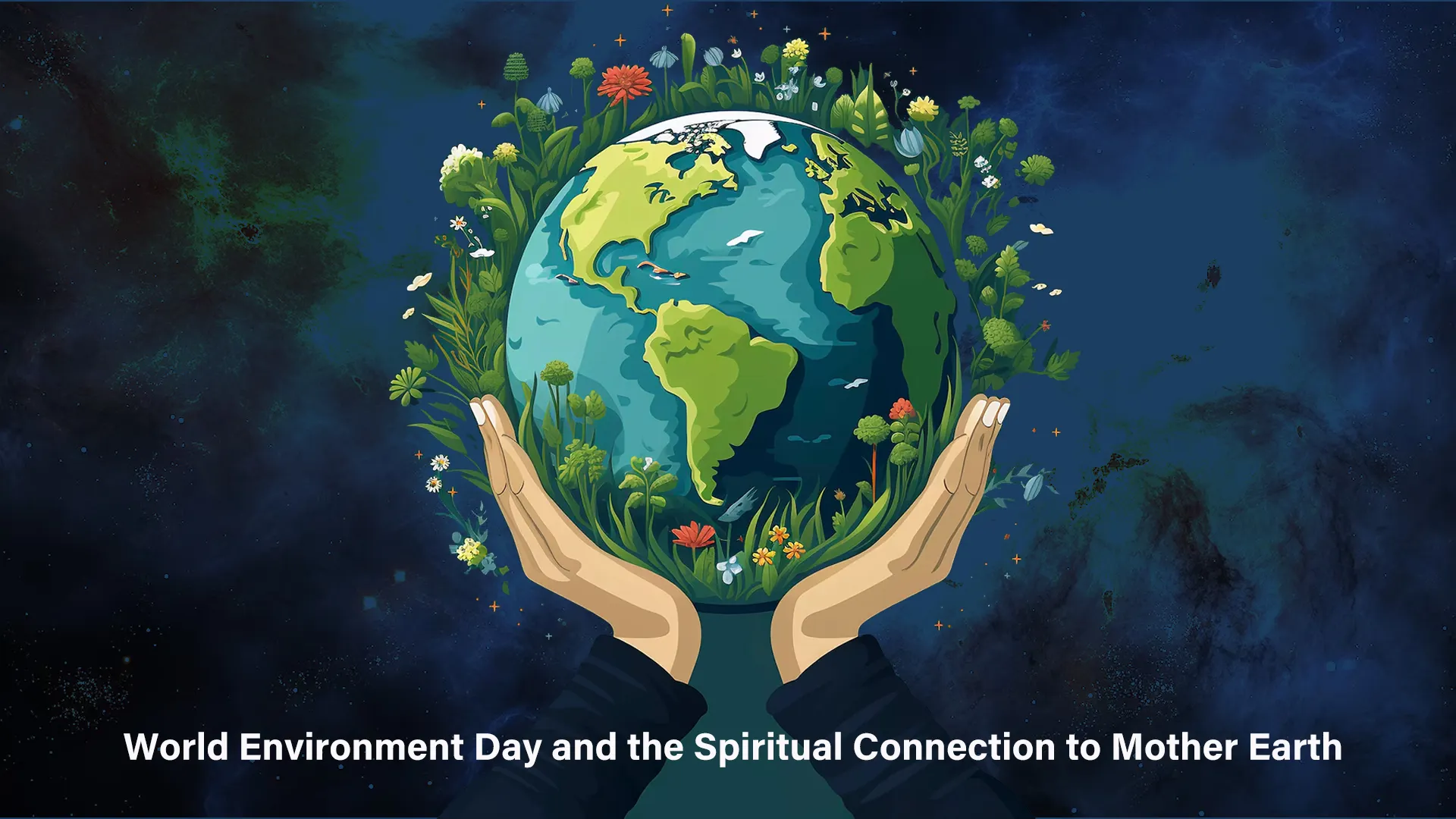Every June 5th, people worldwide unite to commemorate World Environment Day, which was declared in 1974 by the United Nations. This day is dedicated to raising awareness about critical environmental issues and inspiring initiatives to safeguard our planet. As we mark another World Environment Day, it is essential to contemplate our connection with nature and seek ways to contribute to a sustainable and eco-friendly world.
Hinduism, known as Sanatan Dharma, is one of the oldest religions. It emphasises a cyclical creation pattern guided by God's energy. Brahman is the eternal reality from which creation emerges through the material energy of God—Maya—allowing the formless to take finite forms and create the material world.
At the core of this belief system lies a profound reverence for Mother Earth, known as "Bhumi" or "Prithvi." This veneration transcends mere symbolism, shaping spiritual rituals and everyday habits, underscoring the inherent connection between humankind and the natural world.
Mother Earth in Divine Form
The Earth is viewed as a sacred entity, imbued with its own consciousness and energy. This perspective is particularly evident in Hinduism, where the Earth is personified as Bhumi Devi, a goddess symbolising patience, fertility, and nurturing. Bhumi Devi is revered as a provider of sustenance and life, reflecting the profound respect for the natural world ingrained in the religion.
Similarly, Indigenous cultures around the world often perceive the Earth as a living being deserving of reverence and care. This sacred view of the Earth fosters a deep sense of respect and encourages practices that honour and protect the environment.
Bhumi Devi: The Earth Goddess
Bhumi Devi / Bhudevi, or Prithvi, is worshipped as the earth goddess. She is believed to be the consort of Lord Vishnu, the universe's preserver. This connection symbolises the interdependence of preservation and sustainability. Bhumi Devi is portrayed as a nurturing mother offering nourishment and care to all living beings.
Prithvi Sukta: Earth Hymns
The Atharva Veda, an ancient sacred text, contains the Prithvi Sukta, a hymn honouring the Earth. These verses express deep gratitude and reverence towards Mother Earth, recognising her abundance and generosity. They also acknowledge human reliance on the Earth's resources, stressing the significance of harmonious coexistence with nature.
Earth and Spiritual Evolution
The link between Earth and spiritual growth has been a significant and enduring theme throughout history. Many spiritual traditions worldwide emphasise the intrinsic connection between the planet's health and the spiritual development of individuals and communities. This connection underscores that spiritual growth is not solely an internal journey but also a reflection of our bond with the natural world.
As we celebrate World Environment Day, let's draw wisdom from these ancient teachings and acknowledge our responsibility to protect our planet. By embracing sustainable practices, advocating for environmental policies, and spreading awareness, we can contribute to a more sustainable future. World Environment Day serves as a global reminder that environmental well-being is interconnected with our own welfare and that of future generations. Let's reaffirm our commitment to preserving our planet, cultivating a culture of sustainability, and ensuring a brighter, greener future for all.
Theme of World Environment Day 2024: "Restore Our Earth"
Each year, World Environment Day has a specific theme that focuses on a particular aspect of environmental conservation. The theme for 2024 is "Restore Our Earth," emphasising the need for restoration efforts that can revitalise ecosystems, improve biodiversity, and combat climate change. Restoration can take many forms, including reforestation, wetland restoration, and regenerative agriculture. Restoring natural habitats can enhance resilience to environmental shocks and ensure a healthier planet for future generations.
How You Can Make a Difference?
Individual actions, no matter how small, can collectively have a significant impact on the environment. Here are some ways you can contribute to the theme of "Restore Our Earth":
- Plant Trees and Support Reforestation: Trees are vital for absorbing carbon dioxide, providing oxygen, and supporting biodiversity. Participate in local tree-planting initiatives or support organisations dedicated to reforestation. Even planting a single tree in your backyard can make a difference. Prime Minister Narendra Modi of India also launched the tree plantation campaign Ek Ped Maa Ke Naam (One Tree for Mother) to encourage everybody to plant trees.
- Reduce, Reuse, Recycle: Minimise waste by following the three R's: reduce, reuse, and recycle. Opt for products with minimal packaging, repurpose items whenever possible, and recycle materials to prevent them from ending upin landfills.
- Conserve Water: Water is a precious resource, and conserving it is crucial for maintaining healthy ecosystems. Fix leaks, use water-efficient appliances, and adopt water-saving habits like taking shorter showers and using rainwater for gardening.
- Support Sustainable Practices: Choose products and services from companies that prioritise sustainability. Look for eco-friendly certifications, support local and organic food producers, and reduce your carbon footprint by opting for public transportation, biking, or walking.
- Educate and Advocate: Spread awareness about environmental issues and advocate for sustainability policies. Engage with your community, participate in environmental campaigns, and use social media to amplify your message.
Looking Ahead: Our Responsibility
As we look to the future, the message of World Environment Day is clear: we must act now to protect and restore our environment. The decisions we make today will shape the world for future generations. We can create a greener, healthier planet by embracing sustainable practices, supporting environmental policies, and spreading awareness.
Let's Plant a tree for Mother Earth! Ek Ped Prithvi Mata Ke Naam!








